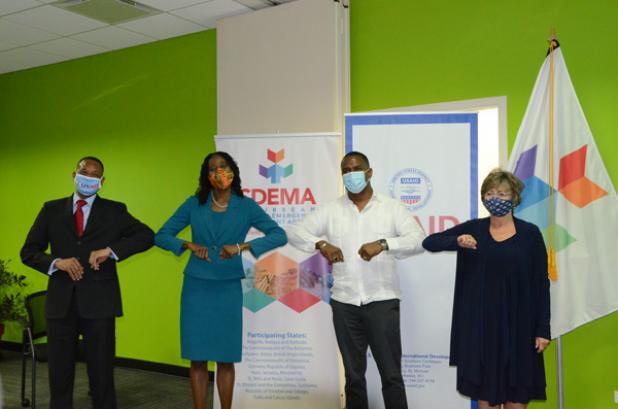
From left: Clinton White, Regional Representative, USAID/Eastern and Southern Caribbean; Acting Executive Director of CDEMA, Elizabeth Riley; Minister of Home Affairs, Information and Public Affairs and Deputy Chairman of the CDEMA Council of Ministers, Wilfred Abrahams; and United States Ambassador to Barbados, the Eastern Caribbean and the OECS, Linda Taglialatela, celebrate the signing of the agreement for the Caribbean Climate Resilience Initiative yesterday morning.
US, CDEMA launch initiative
The United States Government together with the Caribbean Disaster Emergency Management Agency (CDEMA) yesterday launched a US $4.5 million initiative to assist countries in the Caribbean in reducing their vulnerability and building resilience to disaster risk.
Speaking during the launch yesterday morning at CDEMA’s headquarters, the United States Ambassador to Barbados, the Eastern Caribbean and the OECS, Linda Taglialatela said the three-year project, dubbed the ‘Caribbean Climate Resilience Initiative’, is in keeping the United States’ ongoing commitment to achieve a safer and more resilient Caribbean as well as the US-Caribbean Resilience Partnership.
“The Caribbean region is notoriously vulnerable to a magnitude of natural hazards including hurricanes, droughts, earthquakes, floods and tsunamis. More recently, the region has been affected by the exponential growth and movement of Sargassum seaweed, climate variability and their related effects,” Ambassador Taglialatela said.
She added, “We are all too familiar with the devastation wrought by a number of major storms in the last few years. Notably, hurricanes since 2015, including Joaquin, Mathew, Maria, Irma and Dorian demonstrate the cumulative impact of recurrent disasters on the economy, infrastructure and communities.”
In addition to those natural hazards, the Ambassador noted that the region, like the rest of the world, is now faced with COVID-19, which has caused tremendous social and financial upheaval. She said that COVID-19 is challenging the Caribbean’s capacity to respond to natural disasters at the same time as the Atlantic Hurricane Season, which has been predicted to be unusually active this year.
Speaking earlier, Acting Executive Director of CDEMA, Elizabeth Riley said while the world had changed significantly since December 2019 with the onset of COVID-19, there are other parameters which have remained constant, namely the risk posed by the multiplicity of hazards countries in this region face.
“Equally constant is that the changing climate continues to exacerbate hydro-meteorological hazards such as drought, tropical cyclones and severe weather events and the implications for climate sensitive sectors such as tourism, health and agriculture marches on,” Riley said.
Her comments came as she noted that the initial forecast for the 2020 Atlantic Hurricane Season has been revised. As of August 5, she indicated, Colorado State University is now predicting an “extremely active” season with 24 named storms, 12 expected to become hurricanes and five to reach major hurricane strength.
With that in mind, she expressed gratitude to the Government of the United States for the support it has offered CDEMA over the years, including the building out and equipping of the CDEMA Regional Training Centre and the CDEMA building which was commissioned in 2015.
“This is a partnership that CDEMA values. Our shared commitment to partnership extended to the approach to the development of this initiative,” she stated. (JRT)
